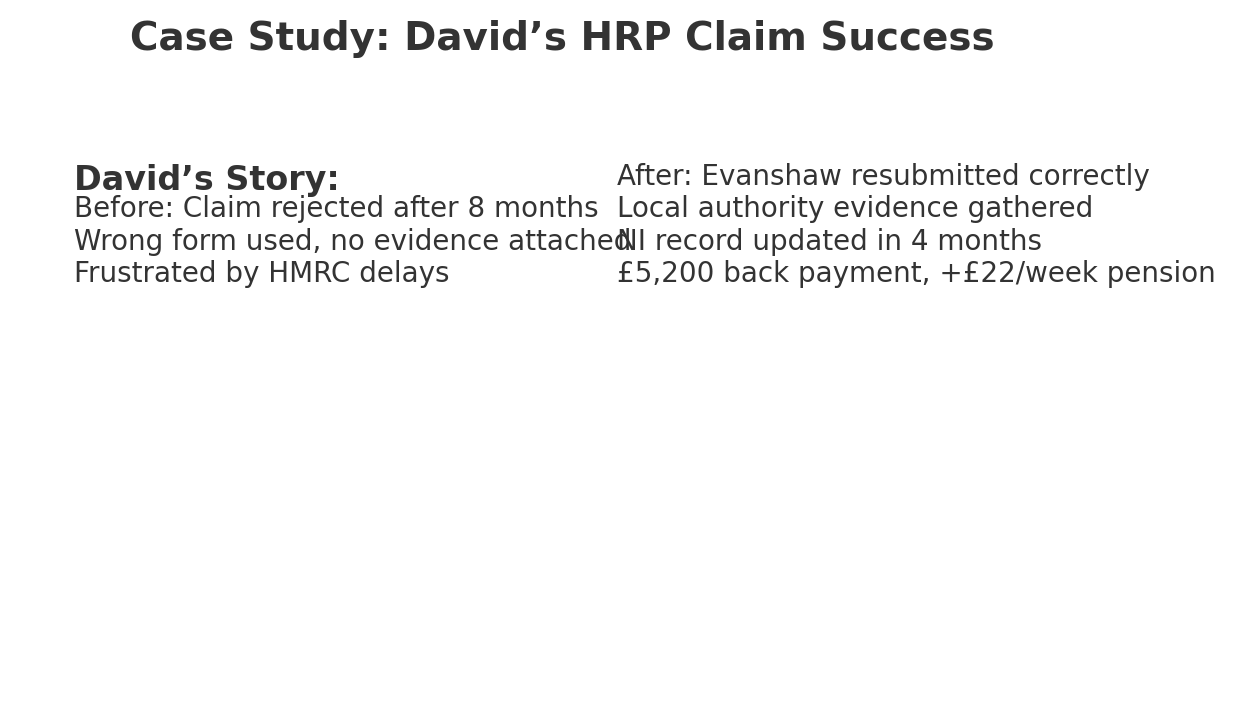Top 10 Mistakes People Make When Claiming HRP (and How to Avoid Them)
Home Responsibilities Protection (HRP) claims are essential for thousands of parents and carers whose State Pension records are missing credits from 1978 to 2010. However, many claims are delayed or rejected because of avoidable mistakes. In this guide, we highlight the 10 most common errors people make when applying for HRP and explain how to avoid them.
HRP Claim Mistakes – At a Glance
- Wrong forms are one of the biggest reasons for rejection.
- Missing NI numbers or documents cause long delays.
- Many people assume Child Benefit was linked automatically before May 2000 – it wasn’t.
- Evanshaw helps avoid these pitfalls by filing correctly and gathering evidence on your behalf.
1. Using the wrong form
HMRC requires form CF411 for HRP claims. Some mistakenly use CF411A (for NI corrections unrelated to HRP), leading to automatic rejection.
Download the correct form here: https://www.gov.uk/government/publications/national-insurance-home-responsibilities-protection
2. Not including your NI number
Before May 2000, Child Benefit forms did not ask for National Insurance numbers. Many HRP claims are missing because NI numbers were never linked. Without your NI number, HMRC cannot update your record.
3. Assuming Child Benefit was linked automatically
If you received Child Benefit before May 2000, HRP credits may not have been added to your NI record. Many claimants assume it was automatic, but this is a major cause of missing years.
4. Missing supporting evidence
HMRC often requests original or certified copies of documents such as Child Benefit award letters or local authority confirmations for foster care. Submitting a claim without evidence almost guarantees delays.
5. Not chasing HMRC for updates
DIY claimants often assume HMRC will process everything promptly. In reality, claims can sit idle unless followed up. Evanshaw tracks claims and chases HMRC for progress.
👉 Avoid the stress – [Check Now with Evanshaw](https://evanshaw.co.uk/carer/check-now/)
6. Submitting incomplete forms
Even small errors — such as unsigned declarations or missing addresses — can cause claims to be returned or delayed. Evanshaw’s team ensures every field is complete before submission.
7. Applying for the wrong years
HRP only applies from 1978 to 2010. Claims outside these years will not be accepted. Since 2010, National Insurance credits replaced HRP.
8. Forgetting widows/next-of-kin claims
Many families do not realise that HRP corrections can be made even after someone has died. Next-of-kin can apply, and arrears may be paid to the estate.
9. Believing corrections happen automatically
HRP credits are not always corrected automatically, even if errors are identified. A formal claim must be made to HMRC.
10. Not keeping copies of documents
Lost forms or missing references can lead to disputes later. Always keep copies of what you send. Evanshaw maintains full records for every claim we manage.
How Evanshaw avoids these mistakes
- We only use the correct HMRC forms (CF411).
- We check NI numbers and link them correctly.
- We gather and organise all supporting documents.
- We track and chase HMRC/DWP so clients don’t have to.
- We specialise in complex cases including widows, carers, and deceased claims.
Start your claim today with no upfront fees — [Check Now](https://evanshaw.co.uk/carer/check-now/).
Case Study: David’s DIY Claim vs Evanshaw
David applied to HMRC himself for HRP credits but used the wrong form and provided no evidence. His claim was rejected after 8 months. Frustrated, he turned to Evanshaw. Within 4 months, we resubmitted correctly, obtained the missing evidence from his local authority, and David’s NI record was updated. He received £5,200 in back payments and an extra £22 per week on his pension.

Frequently Asked Questions
Q: Can I reapply if HMRC rejects my claim?
A: Yes. Many clients come to Evanshaw after initial rejection.
Q: Does Evanshaw guarantee success?
A: No firm can guarantee HMRC decisions, but our expertise significantly improves outcomes.
Q: Can next-of-kin correct HRP credits after someone has died?
A: Yes. HRP can be corrected posthumously, and arrears may be paid to the estate.
Q: How long does Evanshaw take compared to DIY?
A: HMRC sets final timelines, but our complete, organised claims are less likely to face delays.
Q: What if I already tried DIY and gave up?
A: You can still switch to Evanshaw at any stage.
Final Step
👉 Avoid costly mistakes that delay your pension. Let Evanshaw handle the process — [Check Now](https://evanshaw.co.uk/carer/check-now/).
